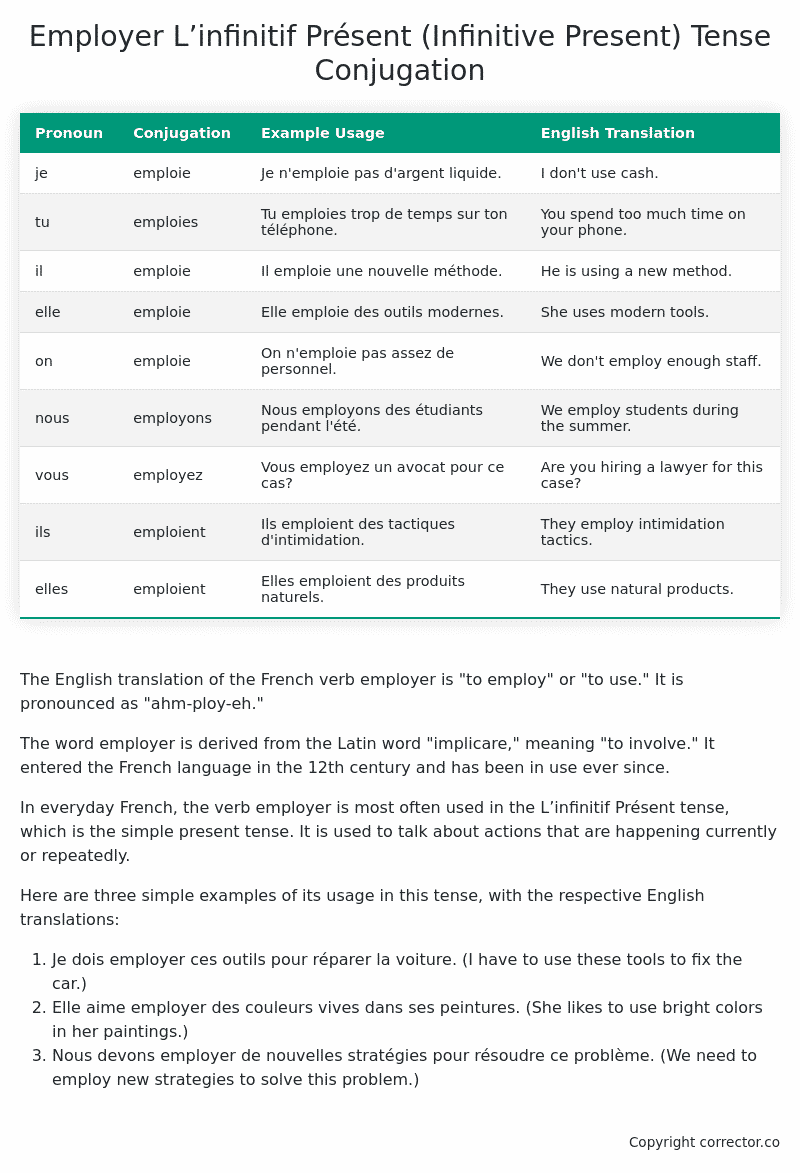L’infinitif Présent (Infinitive Present) Tense Conjugation of the French Verb employer
Introduction to the verb employer
The English translation of the French verb employer is “to employ” or “to use.” It is pronounced as “ahm-ploy-eh.”
The word employer is derived from the Latin word “implicare,” meaning “to involve.” It entered the French language in the 12th century and has been in use ever since.
In everyday French, the verb employer is most often used in the L’infinitif Présent tense, which is the simple present tense. It is used to talk about actions that are happening currently or repeatedly.
Here are three simple examples of its usage in this tense, with the respective English translations:
- Je dois employer ces outils pour réparer la voiture. (I have to use these tools to fix the car.)
- Elle aime employer des couleurs vives dans ses peintures. (She likes to use bright colors in her paintings.)
- Nous devons employer de nouvelles stratégies pour résoudre ce problème. (We need to employ new strategies to solve this problem.)
Table of the L’infinitif Présent (Infinitive Present) Tense Conjugation of employer
| Pronoun | Conjugation | Example Usage | English Translation |
|---|---|---|---|
| je | emploie | Je n’emploie pas d’argent liquide. | I don’t use cash. |
| tu | emploies | Tu emploies trop de temps sur ton téléphone. | You spend too much time on your phone. |
| il | emploie | Il emploie une nouvelle méthode. | He is using a new method. |
| elle | emploie | Elle emploie des outils modernes. | She uses modern tools. |
| on | emploie | On n’emploie pas assez de personnel. | We don’t employ enough staff. |
| nous | employons | Nous employons des étudiants pendant l’été. | We employ students during the summer. |
| vous | employez | Vous employez un avocat pour ce cas? | Are you hiring a lawyer for this case? |
| ils | emploient | Ils emploient des tactiques d’intimidation. | They employ intimidation tactics. |
| elles | emploient | Elles emploient des produits naturels. | They use natural products. |
Other Conjugations for Employer.
Le Present (Present Tense) Conjugation of the French Verb employer
Imparfait (Imperfect) Tense Conjugation of the French Verb employer
Passé Simple (Simple Past) Tense Conjugation of the French Verb employer
Passé Composé (Present Perfect) Tense Conjugation of the French Verb employer
Futur Simple (Simple Future) Tense Conjugation of the French Verb employer
Futur Proche (Near Future) Tense Conjugation of the French Verb employer
Plus-que-parfait (Pluperfect) Tense Conjugation of the French Verb employer
Passé Antérieur (Past Anterior) Tense Conjugation of the French Verb employer
Futur Antérieur (Future Anterior) Tense Conjugation of the French Verb employer
Subjonctif Présent (Subjunctive Present) Tense Conjugation of the French Verb employer
Subjonctif Passé (Subjunctive Past) Tense Conjugation of the French Verb employer
Subjonctif Imparfait (Subjunctive Imperfect) Tense Conjugation of the French Verb employer
Subjonctif Plus-que-parfait (Subjunctive Pluperfect) Tense Conjugation of the French Verb employer
Conditionnel Présent (Conditional Present) Tense Conjugation of the French Verb employer
Conditionnel Passé (Conditional Past) Tense Conjugation of the French Verb employer
L’impératif Présent (Imperative Present) Tense Conjugation of the French Verb employer
L’infinitif Présent (Infinitive Present) Tense Conjugation of the French Verb employer (this article)
Struggling with French verbs or the language in general? Why not use our free French Grammar Checker – no registration required!
Get a FREE Download Study Sheet of this Conjugation 🔥
Simply right click the image below, click “save image” and get your free reference for the employer L’infinitif Présent tense conjugation!

Employer – About the French L’infinitif Présent (Infinitive Present) Tense
Forming the Infinitive Present
Common Everyday Usage Patterns
As a Verb’s Dictionary Form
After Modal Verbs
As an Imperative
In Infinitive Clauses
Interactions with Other Tenses
Present Tense
Future Tense
Conditional Tense
Passé Composé
Imperfect Tense
Subjunctive and Conditional Moods
Summary
Want More?
I hope you enjoyed this article on the verb employer. Still in a learning mood? Check out another TOTALLY random French verb conjugation!


